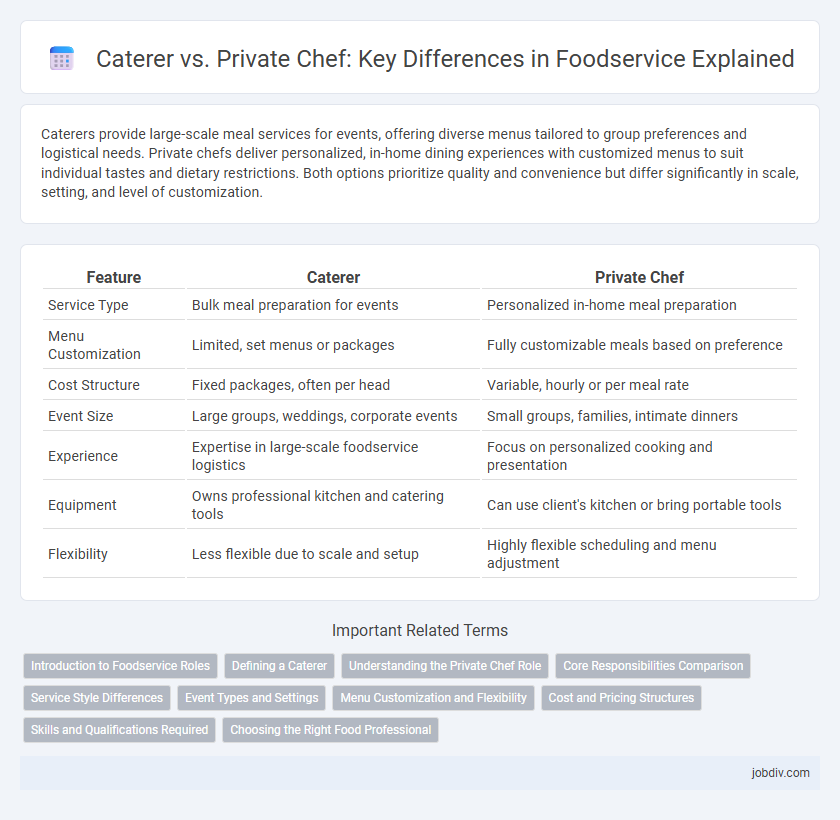Caterers provide large-scale meal services for events, offering diverse menus tailored to group preferences and logistical needs. Private chefs deliver personalized, in-home dining experiences with customized menus to suit individual tastes and dietary restrictions. Both options prioritize quality and convenience but differ significantly in scale, setting, and level of customization.
Table of Comparison
| Feature | Caterer | Private Chef |
|---|---|---|
| Service Type | Bulk meal preparation for events | Personalized in-home meal preparation |
| Menu Customization | Limited, set menus or packages | Fully customizable meals based on preference |
| Cost Structure | Fixed packages, often per head | Variable, hourly or per meal rate |
| Event Size | Large groups, weddings, corporate events | Small groups, families, intimate dinners |
| Experience | Expertise in large-scale foodservice logistics | Focus on personalized cooking and presentation |
| Equipment | Owns professional kitchen and catering tools | Can use client's kitchen or bring portable tools |
| Flexibility | Less flexible due to scale and setup | Highly flexible scheduling and menu adjustment |
Introduction to Foodservice Roles
Caterers manage large-scale food production for events and institutions, coordinating menu planning, food preparation, and service logistics to accommodate diverse client needs. Private chefs provide personalized culinary experiences within individual households or small groups, tailoring meals to specific dietary preferences and lifestyle requirements. Understanding these distinct foodservice roles highlights differences in scope, client interaction, and operational scale.
Defining a Caterer
A caterer in the foodservice industry specializes in preparing and delivering large quantities of meals for events such as weddings, corporate gatherings, and parties, ensuring menu variety and scalability. Unlike a private chef who customizes dishes for individual clients in smaller, more intimate settings, caterers manage logistics, coordination, and service for multiple guests simultaneously. Their expertise includes menu planning, food safety compliance, and efficient on-site or off-site food preparation to accommodate diverse dietary needs and large-volume orders.
Understanding the Private Chef Role
A private chef provides personalized culinary services tailored to individual client preferences, often working in private homes or exclusive settings. Their responsibilities include menu planning, grocery shopping, meal preparation, and kitchen management, ensuring a bespoke dining experience. Unlike caterers who serve large events, private chefs focus on consistent, intimate service for daily meals or special occasions.
Core Responsibilities Comparison
Caterers specialize in planning, preparing, and serving large-scale meals for events, managing menu creation, food production, and logistics to accommodate diverse guest counts efficiently. Private chefs focus on personalized meal preparation tailored to individual tastes and dietary needs, often working in private homes or exclusive settings. Both roles require culinary expertise, but caterers emphasize bulk food production and event coordination, whereas private chefs prioritize customization and intimate dining experiences.
Service Style Differences
Caterers typically offer large-scale foodservice with a focus on buffet or plated meal presentations, accommodating numerous guests simultaneously through efficient, standardized service. Private chefs provide personalized, intimate dining experiences, often preparing customized menus and serving dishes directly to individuals or small groups in private settings. The service style of caterers emphasizes scalability and consistency, while private chefs prioritize bespoke culinary craftsmanship and direct interaction.
Event Types and Settings
Caterers specialize in large-scale events such as weddings, corporate functions, and galas, providing buffet or plated meals tailored to group preferences and dietary requirements. Private chefs typically serve intimate settings like home dinners, small parties, and exclusive gatherings, offering personalized menus and on-site meal preparation. Event types for caterers often demand logistical coordination and menu variety, whereas private chefs emphasize customized culinary experiences in private residences.
Menu Customization and Flexibility
Caterers offer standardized menu packages with limited room for customization, often designed to efficiently serve large groups while maintaining cost-effectiveness. Private chefs provide highly flexible, bespoke menus tailored to individual dietary preferences, ingredient sourcing, and occasion-specific themes, enhancing personalization and culinary creativity. Menu customization by private chefs allows for adjustments in flavor profiles, portion sizes, and presentation styles that caterers typically cannot match due to scale and operational constraints.
Cost and Pricing Structures
Caterers typically charge based on a per-person rate that includes food, labor, and equipment, often benefiting larger events with scalable pricing. Private chefs usually present a flat fee or hourly rate that covers personalized menu creation, grocery shopping, and onsite preparation, reflecting a more customized and intimate dining experience. Cost differences hinge on event size, with caterers offering efficiency for groups and private chefs providing tailored services at a premium price.
Skills and Qualifications Required
Caterers require expertise in food safety certifications, large-scale menu planning, and efficient team management to serve diverse client needs effectively. Private chefs demand advanced culinary skills, personalized meal preparation, and adaptability to clients' dietary preferences and lifestyle restrictions. Both roles benefit from strong organizational abilities, creativity in menu design, and experience in high-quality ingredient sourcing.
Choosing the Right Food Professional
Selecting between a caterer and a private chef depends on the event size, menu customization, and budget constraints. Caterers offer comprehensive services for large gatherings, including staff, setup, and diverse menu options, while private chefs provide personalized, on-demand culinary experiences tailored to smaller, intimate settings. Evaluating factors like dietary preferences, event logistics, and desired interaction with the chef will ensure the best choice for a seamless foodservice experience.
Caterer vs Private Chef Infographic

 jobdiv.com
jobdiv.com